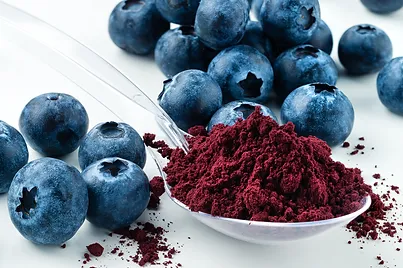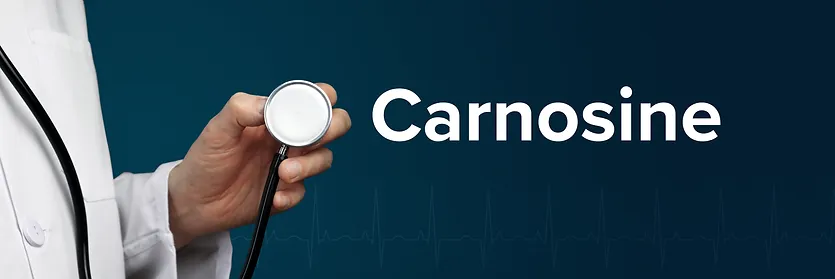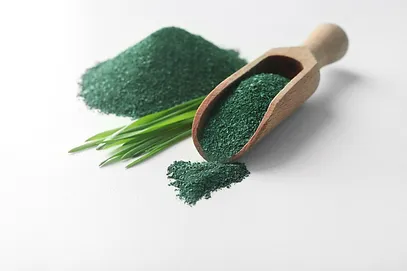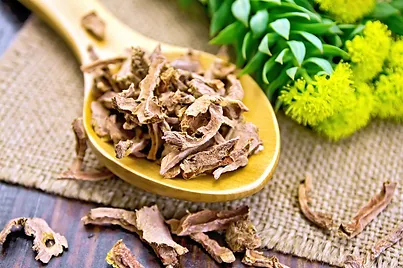Blueberry Fruit Extract

Beneficial Effects of Blueberry Extracts on Adult Human Stem Cells
Blueberry extracts confer anti-oxidative, anti-inflammatory and neuroprotective effects on control and Parkinson’s AHNPs (adult human neural progenitor), suggesting a role for dietary nutrients in helping to slow progression of neural dysfunction and neurodegenerative disease during aging.
Blueberry Fruit Extract benefits include prevention of many conditions related to chronic disease
Blueberry is rich in flavonoids (mainly anthocyanidins), polyphenols (procyanidin), phenolic acids, pyruvic acid, chlorogenic acid, and others, which have, anti-obesity, prevent degenerative diseases, anti-inflammation, protective properties for vision and liver, prevent heart diseases, combat diabetes, improve brain function, protective lung properties, strong bones, enhance immunity, prevent cardiovascular diseases, and improve cognitive decline.
Blueberry Extract: Increased Proliferation of Human Stem Cells
A dose-related effect of blueberry, green tea, catechin, carnosine, and vitamin D(3) was observed on proliferation with human bone marrow as compared with human granulocyte-macrophage colony-stimulating factor (hGM-CSF). We further show that combinations of nutrients produce a synergistic effect to promote proliferation of human hematopoietic progenitors. This demonstrates that nutrients can act to promote healing via an interaction with stem cell populations.
Green Tea Extract

Green Tea Extract: Increased Proliferation of Human Stem Cells
A dose-related effect of blueberry, green tea, catechin, carnosine, and vitamin D(3) was observed on proliferation with human bone marrow as compared with human granulocyte-macrophage colony-stimulating factor (hGM-CSF). We further show that combinations of nutrients produce a synergistic effect to promote proliferation of human hematopoietic progenitors. This demonstrates that nutrients can act to promote healing via an interaction with stem cell populations.
Green Tea: Evidence To Support Its Role To Combat The Effects Of Aging And To Promote Neural Protection
Accumulated evidence thus far seems to indicate that catechins help prevent neurodegeneration and delay brain function decline.
Beneficial Effects Of Green Tea: A Literature Review
Human studies have shown benefits from using green tea catechins which and have a beneficial outcome on metabolic syndromes, such as obesity, type II diabetes, and cardiovascular risk factors. Long-term consumption of tea catechins could be beneficial against high-fat diet-induced obesity and type II diabetes and could reduce the risk of coronary disease.
Beneficial Effects Of Green Tea On Age Related Diseases
There is increasing evidence that consumption of green tea has preventative effects in obesity, hypertension, insulin resistance, type II diabetes, atherosclerosis, coronary heart disease and Metabolic Syndrome (MetS). The catechins in green tea has been found to be beneficial in obesity induced by a high-fat diet.

The Potential of Carnosine in Brain-Related Disorders: A Comprehensive Review of Current Evidence
A dose-related effect of blueberry, green tea, catechin, carnosine, and vitamin D(3) was observed on proliferation with human bone marrow as compared with human granulocyte-macrophage colony-stimulating factor (hGM-CSF). We further show that combinations of nutrients produce a synergistic effect to promote proliferation of human hematopoietic progenitors. This demonstrates that nutrients can act to promote healing via an interaction with stem cell populations.
L-Carnosine: Increased Proliferation of Human Stem Cells
A dose-related effect of blueberry, green tea, catechin, carnosine, and vitamin D(3) was observed on proliferation with human bone marrow as compared with human granulocyte-macrophage colony-stimulating factor (hGM-CSF). We further show that combinations of nutrients produce a synergistic effect to promote proliferation of human hematopoietic progenitors. This demonstrates that nutrients can act to promote healing via an interaction with stem cell populations.

Spirulina promotes stem cell genesis and protects against LPS induced declines in neural stem cell proliferation
When examined on neural stem cells in culture spirulina increased proliferation at baseline and protected against the negative influence of TNFalpha to reduce neural stem cell proliferation. These results support the hypothesis that a diet enriched with spirulina and other nutraceuticals may help protect the stem/progenitor cells from insults.

Antioxidant, Immunomodulating, and Microbial-Modulating Activities of the Sustainable and Ecofriendly Spirulina
The highly nutritional and ecofriendly Spirulina (Arthrospira platensis) has hypolipidemic, hypoglycemic, and antihypertensive properties. Spirulina contains functional compounds, such as phenolics, phycocyanins, and polysaccharides, with antioxidant, anti-inflammatory, and immunostimulating effects. Spirulina supplements seem to affect more effectively the innate immunity, promoting the activity of natural killer cells.
Spirulina Microalgae and Brain Health: A Scoping Review of Experimental and Clinical Evidence
Spirulina microalgae contain a plethora of nutrient and non-nutrient molecules providing brain health benefits. Numerous in vivo evidence has provided support for the brain health potential of spirulina, highlighting antioxidant, anti-inflammatory, and neuroprotective mechanisms. Preliminary clinical studies have also suggested that spirulina can help to reduce mental fatigue, protect the vascular wall of brain vessels from endothelial damage and regulate internal pressure, thus contributing to the prevention and/or mitigating of cerebrovascular conditions. Furthermore, the use of spirulina in malnourished children appears to ameliorate motor, language, and cognitive skills, suggesting a reinforcing role in developmental mechanisms. Evidence of the central effect of spirulina on appetite regulation has also been shown.
Spirulina Microalgae and Brain Health: A Scoping Review of Experimental and Clinical Evidence
The antioxidant, immunomodulatory, and anti-inflammatory activities of these microalgae may play an important role in human health. In this review, they discuss the antioxidant, immunomodulatory, and anti-inflammatory activities of Spirulina in both animals and humans, along with the underlying mechanisms. Spirulina activates cellular antioxidant enzymes, inhibits lipid peroxidation and DNA damage, scavenges free radicals, and increases the activity of superoxide dismutase and catalase. Clinical trials show that Spirulina prevents skeletal muscle damage under conditions of exercise-induced oxidative stress and can stimulate the production of antibodies and up- or downregulate the expression of cytokine-encoding genes to induce immunomodulatory and anti-inflammatory responses.
Resveratrol

Reveratrol And Stem Cells: The application of resveratrol to mesenchymal stromal cell-based regenerative medicine
Resveratrol is a natural agent that possesses great therapeutic potential for protecting against acute or chronic injury in multiple tissues as a result of its antioxidative and anti-inflammatory. According to its demonstrated properties, RSV may improve the therapeutic effects of MSCs via enhancing their survival, self-renewal, lineage commitment, and anti-aging effects. In this review, we concluded that RSV significantly improved the preventive and therapeutic effects of MSCs against multiple diseases. We also described the underlying mechanisms of the effects of RSV on the survival, self-renewal, and lineage commitment of MSCs in vitro and in vivo.
Resveratrol and Brain Mitochondria: a Review
Resveratrol has been viewed as an antioxidant, anti-inflammatory, and anti-apoptotic. Moreover, it has been reported that resveratrol modulates mitochondrial function, redox biology, and dynamics in both in vitro and in vivo experimental models.
Effects and Mechanisms of Resveratrol on Aging and Age-Related Diseases
Many studies reported that resveratrol possessed various bioactivities, such as antioxidant, anti-inflammatory, cardiovascular protection benefits, benefits against diabetes mellitus, helps support a healthy weight, neuroprotection, and even some research showing antiaging effects. The antiaging mechanisms of resveratrol were mainly ameliorating oxidative stress, relieving inflammatory reaction, improving mitochondrial function, and regulating apoptosis. Resveratrol could be an effective and safe compound for the prevention and treatment of aging and age-related diseases.
Rhodiola

The effects of Rhodiola rosea extract on 5-HT level, cell proliferation and quantity of neurons at cerebral hippocampus of depressive rats
The purpose of this study was to investigate the effects of Rhodiola roseaextract and depression on the serotonin (5-HT) level, cell proliferation and quantity of neurons at cerebral hippocampus of depressive rats induced by Chronic Mild Stress (CMS).
The results demonstrated that Rhodiola rosea extract could improve 5-HT level in hippocampus in depressive rats, and low dosage Rhodiola rosea could induce neural stem cell proliferation at hippocampus to return to normal level, repairing the injured neurons at hippocampus.
Anti-inflammatory effects of Rhodiola rosea L.: A review
Rhodiola rosea L. extracts, preparation and purified compounds have been proved to exert anti-inflammatory activity in various pathological conditions, including cardiovascular disease, neurodegenerative diseases (Parkinson’s, Alzheimer’s, etc), metabolic disease (diabetes and related complications such as neuropathy, nephropathy, etc.), arthritis, cancer etc. Compared with other anti-inflammation preparations, Rhodiola rosea has an advantage for long-term use.
Rhodiola rosea L.: an herb with anti-stress, anti-aging, and immunostimulating properties for cancer chemoprevention
In addition to its multiplex stress-protective activity, Rhodiola rosea extracts have recently demonstrated its anti-aging, anti-inflammation, immunostimulating, DNA repair and anti-cancer effects in different model systems. Molecular mechanisms of Rhodiola rosea extracts’s action have been studied mainly along with one of its bioactive compounds, salidroside. Both Rhodiola rosea extracts and salidroside have contrast molecular mechanisms on cancer and normal physiological functions. In contrast to many natural compounds, salidroside is water-soluble and highly bioavailable via oral administration and concentrated in urine by kidney excretion. Rhodiola rosea extracts and salidroside can impose cellular and systemic benefits similar to the effect of positive lifestyle interventions to normal physiological functions and for anti-cancer. The unique pharmacological properties of Rhodiola rosea extracts or salidroside deserve further investigation for cancer chemoprevention, in particular for human urinary bladder cancer.
Vitamin D (Cholecalciferol)

Vitamin D(3): Increased Proliferation of Human Stem Cells
A dose-related effect of blueberry, green tea, catechin, carnosine, and vitamin D(3) was observed on proliferation with human bone marrow as compared with human granulocyte-macrophage colony-stimulating factor (hGM-CSF). We further show that combinations of nutrients produce a synergistic effect to promote proliferation of human hematopoietic progenitors. This demonstrates that nutrients can act to promote healing via an interaction with stem cell populations.
Vitamin D Deficiency: Effects on Oxidative Stress, Epigenetics, Gene Regulation, and Aging
Some of the key functions of vitamin D include subduing oxidative stress and chronic inflammation and maintaining mitochondrial respiratory functions. Through its targeted mitochondrial activity and subduing of ROS through multiple mechanisms, vitamin D has key beneficial effects on controlling oxidative stress, inflammation, and energy metabolism.
The Impact of Vitamin D Levels on Inflammatory Status: A Systematic Review of Immune Cell Studies
Twenty three studies (7 cell line and 16 PBMCs studies) met our criteria. All studies selected except one used the active metabolite 1,25(OH)2, with one study using cholecalciferol and two studies also using 25(OH)D. Four out of seven cell line studies showed an anti-inflammatory effect where suppression of key markers such as macrophage chemotactic protein 1, interleukin 6 and interleukin 8 were observed. Fourteen of sixteen PBMC studies also showed a similar anti-inflammatory effect based on common inflammatory endpoints. Mechanisms for such effects included decreased protein expression of toll-like receptor-2 and toll-like receptor-4; lower levels of phosphorylated p38 and p42/42; reduced expression of phosphorylated signal transducer and activator of transcription 5 and decreased reactive oxygen species. This review demonstrates that an anti-inflammatory effect of vitamin D is a consistent observation in studies of cell lines and human derived PBMCs.
BioPerine®

Black Pepper Extract – A Natural Bioavailability Enhancer
Black pepper extract (BioPerine®) is a standardized extract, prepared from the dried fruits of Piper nigrum(black pepper) and contains a minimum of 95% Piperine. It is clinically studied for its ability to enhance the bioavailability of the nutrients. It has been well recognized as a bioavailability enhancer for nearly two decades, and it is the only source of black pepper to have undergone clinical studies in the United States and several other countries, which substantiate its safety and efficacy for nutritional use.
Traditional knowledge with modern benefits
The spicy or “hot” taste of pepper when sprinkled on food is well known. The perception of heat is stronger when fresh pepper is used. This heat is in fact a manifestation of the biological activity of some of the active compounds found in pepper, the most notable of these being piperine.
Black pepper is considered the “King of Spices” throughout the world due to its pungent principle piperine.
BioPerine® is a patented extract obtained from black pepper fruits (Piper nigrum) standardized minimum to 95% Piperine.
BioPerine® has been used as a bioavailability enhancer for over 20 years.
BioPerine® may be co-administered with various nutrients to enhance their bioavailability in both human and animal.
In general, BioPerine® was found to enhance absorption of nutrients by at least 30%.
Black pepper is one of the spices which has been used for ages to flavor various cuisines throughout the globe. It is especially known for its pungent flavor and thermogenic activity. The black pepper has been used traditional medicines as an adjuvant to support knee pain, abdominal discomfort, to enhance mood, tiredness, manage a healthy weight, etc (Heerasing et al., 2019). Subsequently, piperine is no more just a spice, but is being considered as a food supplement, thermonutrient and as a natural bioavailability enhancer. Out of many pharmacological benefits of the black pepper extract, its bioavailability enhancing ability is widely accepted.
